新人教版|八年级下册所有重点单词、短语和句型全汇总
- 格式:docx
- 大小:118.43 KB
- 文档页数:41

初二英语下册知识点归纳人教版一、Unit 1 What's the matter?1. 重点短语。
- have a cold 感冒。
- have a stomachache 胃痛;腹痛。
- have a sore back 背痛。
- lie down 躺下。
- take one's temperature 量体温。
- have a fever 发烧。
- take breaks (take a break) 休息。
- get off 下车。
- to one's surprise 使……惊讶的是;出乎……意料。
- right away 立即;马上。
- get into 陷入;参与。
- be used to 习惯于……;适应于……- take risks (take a risk) 冒险。
- run out (of) 用尽;耗尽。
- cut off 切除。
- get out of 离开;从……出来。
- be in control of 掌管;管理。
2. 重点句型。
- What's the matter? = What's wrong? = What's the trouble? 怎么了?- Should I put some medicine on it? 我应该在它(伤口)上敷些药吗?- You should lie down and rest. 你应该躺下休息。
- He hurt himself in P.E. class. 他在体育课上伤到了自己。
- Aron Ralston is an American man who is interested in mountain climbing. 阿伦·罗尔斯顿是一个对登山感兴趣的美国人。
3. 语法。
- 情态动词should的用法:should表示“应该”,用来提出建议或劝告,后接动词原形。
例如:You should see a dentist. 否定形式为shouldn't,例如:You shouldn't go to school late.二、Unit 2 I'll help to clean up the city parks.1. 重点短语。

新人教版|八年级下册英语所有知识点大汇总!Unit1 what' s the matter?1. It’s +形容词+ for sb. + to do sth. 做某事对某人来说是…的。
It’s important to do sth. 做某事很重要。
It’s important for me to eat a balanced diet. 平衡饮食对我来说是很重要的.It’s easy to do sth. 做某事是容易的。
It’s easy for us to find out the answer. 找出答案对我们来说是容易的。
2. 情态动词should的用法should是情态动词,它的基本用法是必须和其他动词一起构成谓语。
意为"应该......"。
should(应当,应该)用于所有人称,表示劝告或建议。
eg. ---I have a very bad cold. 我感冒很厉害。
---You should lie down and have a rest. 你应该躺下,多喝水。
3. maybe与may be(1)maybe是副词,译为“也许、可能”,相当于“perhaps”。
如:Maybe he can answer the question. 也许他能回答那个问题。
He maybe is from the USA, too. 他可能也来自美国。
(2)may be中的may为情态动词,译为“可能是......”。
如:He may be from the USA, too. 他可能也来自美国。
She may be our English teacher. 她可能是我们的英语老师。
4. few、a few、little、a little的区别和联系:(1)few / a few用来修饰可数名词,few表示否定意义,没有,几乎没有;a few表示肯定意义,有几个。
例如:He has few friends here, he feels lonely. 他这里没朋友,他感觉寂寞。

最新人教版八年级下册英语全册知识点大全Unit 1重点短语:have a stomachache have a cold lie downtake one’s temperature have a fever go to a doctorto one’s surprise agree to (do sth.)get into troublebe used to take risks run out (of)cut off get out of be in control ofkeep on ( doing sth.)give up语言知识归纳:1. What’s the matter (w ith you)?此句用来询问别人的病情。
类似的句子还有:What’s wrong with you?/ What’s the trouble?matter作动词用,意为“要紧”“有关系”,主要用于疑问句和否定句。
What does it matter? It doesn’t matter.【例题】Does it ________ if we can’t finish it today?A. mindB. mindsC. matterD. matters2. I have a sore throat.have “患病”,常用“have a /an+ 名词”.have a cold have a fever have a sore backhave a stomachache have a cough【例题】( )---Does he often have ______ cold? ---Yes. He also _____a cough and a sore throat.A. a; hasB. /; hasC. a; haveD. /; have3.Lie down and rest! 躺下休息lie down 躺下4.That’s probably why. 那可能就是原因。
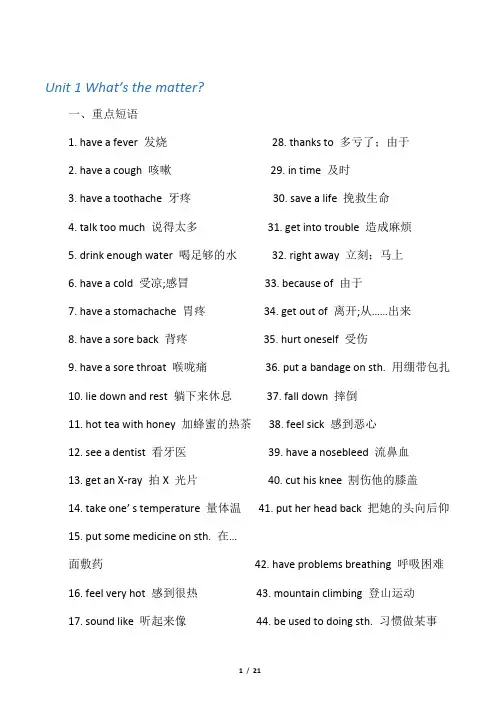
Unit 1 What’s the matter?一、重点短语1. have a fever 发烧28. thanks to 多亏了;由于2. have a cough 咳嗽29. in time 及时3. have a toothache 牙疼30. save a life 挽救生命4. talk too much 说得太多31. get into trouble 造成麻烦5. drink enough water 喝足够的水32. right away 立刻;马上6. have a cold 受凉;感冒33. because of 由于7. have a stomachache 胃疼34. get out of 离开;从……出来8. have a sore back 背疼35. hurt oneself 受伤9. have a sore throat 喉咙痛36. put a bandage on sth. 用绷带包扎10. lie down and rest 躺下来休息37. fall down 摔倒11. hot tea with honey 加蜂蜜的热茶38. feel sick 感到恶心12. see a dentist 看牙医39. have a nosebleed 流鼻血13. get an X-ray 拍X 光片40. cut his knee 割伤他的膝盖14. take one’ s temperature 量体温41. put her head back 把她的头向后仰15. put some medicine on sth. 在…面敷药42. have problems breathing 呼吸困难16. feel very hot 感到很热43. mountain climbing 登山运动17. sound like 听起来像44. be used to doing sth. 习惯做某事18. all weekend 整个周末45. run out (of) 用完;用尽19. in the same way 以同样的方式46. so that 以便20. go to a doctor 看医生47. so. . . that 如此… …以至于…21. go along 沿着……走48. be in control of 掌管;管理22. on the side of the road 在马路边49. in a difficult situation 在闲境屮23. shout for help 大声呼救50. keep on doing sth. 继续或坚持做某事24. without thinking twice 没有多想51. make a decision 做出决定25. get off 下车52. take risks 冒险26. have a heart problem 有心脏病53. give up 放27. to one’ s surprise 使.......惊讶的二、重点句型1. What’ s the matter?What’ s the matter with you?= What’s the trouble with you?= What’ s wrong with you?你怎么了?2. What should she do? 她该怎么办呢?Should I take my temperature? 我应该量一下体温吗?主语+ should/shouldn’t + 动词原形. ..①You should lie down and rest. 你应该躺下休息一会儿。
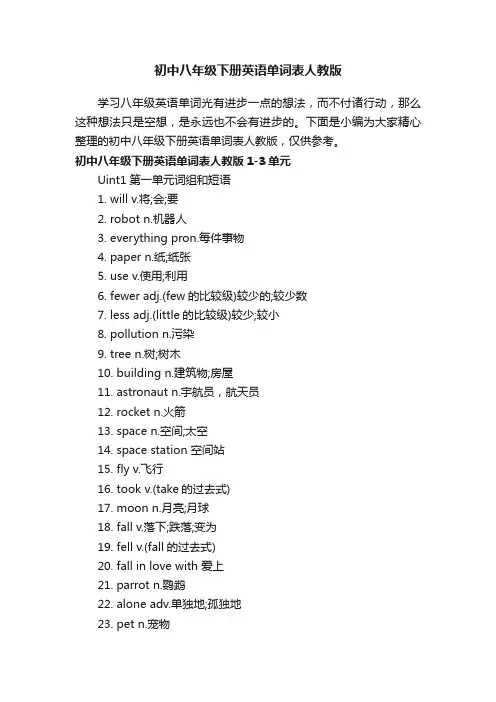
初中八年级下册英语单词表人教版学习八年级英语单词光有进步一点的想法,而不付诸行动,那么这种想法只是空想,是永远也不会有进步的。
下面是小编为大家精心整理的初中八年级下册英语单词表人教版,仅供参考。
初中八年级下册英语单词表人教版1-3单元Uint1第一单元词组和短语1. will v.将;会;要2. robot n.机器人3. everything pron.每件事物4. paper n.纸;纸张5. use v.使用;利用6. fewer adj.(few的比较级)较少的;较少数7. less adj.(little的比较级)较少;较小8. pollution n.污染9. tree n.树;树木10. building n.建筑物;房屋11. astronaut n.宇航员,航天员12. rocket n.火箭13. space n.空间;太空14. space station 空间站15. fly v.飞行16. took v.(take的过去式)17. moon n.月亮;月球18. fall v.落下;跌落;变为19. fell v.(fall的过去式)20. fall in love with 爱上21. parrot n.鹦鹉22. alone adv.单独地;孤独地23. pet n.宠物24. probably adv.大概;或许25. suit n.一套衣服26. able adj.能;能够27. be able to 能够……;得以……28. dress v.穿衣29. casually adv.非正式地;随意地30. which pron.哪个;哪几个31. even adv.甚至32. The World Cup 世界杯33. wrote v.(write的过去式)34. myself pron.(反身代词)我自己;我本人35. interview n.面试;面谈36. predict v.预报;预言37. future n.将来;未来38. prediction n.预言;预测39. came v.(come的过去式)40. come true 实现;达到41. Sound n.声音42. Company n.公司43. Thought v.(think的过去式)44. Fiction n.小说45. unpleasant adj.使人不愉快的46. scientist n.科学家47. in the future 未来;将来48. hundreds of 大量;许多49. already adv.早已;已经50. made v.(make的过去式)51. factory n.工厂52. simple adj.简单的;简易的53. such adj.这样的;这种54. bored adj.厌烦的;厌倦的55. everywhere adv.各地;到处56. human n.人;人类57. shape n.外形;形状58. huge n.巨大的;极大的59. earthquake n.地震60. snake n.蛇61. possible adj.可能的62. electric adj.电的;导电的63. toothbrush n.牙刷64. seem v.像是;似乎65. impossible adj.不可能的;不会发生的66. housework n.家务;家务事67. rating n.级别;等级uint2第二单元词组和短语1. keep out 不让……进入2. play v.播放3. part-time job 兼职工作4. argue v.争论;争吵5. wrong adj.错误的;有毛病的;不合适的6. style n.风格7. out of style 不时髦的,过时的8. could modal v. can的过去式9. What’s the matter 怎么了10. call sb. up 打电话给……11. ticket n.票;入场券12. surprise v.使惊奇;使意外13. on the phone 用电话交谈;在通话14. pay for 付款15. okay adj.好的16. either adj.任一的;(两方中的)每一方的adv.同样地(不…);也(不…)17. bake v.烤;烘18. bake sale 面包或糕饼的售卖活动19. tutor n.家庭教师20. original adj.新颖的21. the same as 与……同样的22. in style 时髦的;流行的23. haircut n.理发;发型24. except prep.除;把--除外25. upset adj.心烦的,沮丧的26. return v.归还;送回27. fail v.失败28. get on 相处;进展29. football n.足球30. until prep.到--为止31. fit v.适合;适应32. as……as possible 尽可能……33. pressure n.压力34. complain v.抱怨;控诉35. include v.包括;包含36. pushy adj.固执己见的;一意孤行的37. push v.推;推动;督促38. sent v.发送;寄39. all kinds of 各种;许多40. compare v.比较41. crazy adj.疯狂的;狂热的42. themselves pron.(反身代词)他(她,它)们自己43. adult n.成年人44. on the one hand (在)一方面45. organized adj.有组织的46. on the other hand (在)另一方面47. freedom n.自由uint3第三单元词组和短语1. UFO abbr.不行飞行物;飞碟2. barber n.(为男子服务的)理发师3. barber shop 理发店4. bathroom n.浴室5. bedroom n.卧室;寝室6. kitchen n.厨房7. get out 出去;离开8. cut v.剪;切;割9. alien n.从另一个世界来的生物;外星人10. bought v.(buy的过去式)11. land v.着陆12. got v.(get的过去式)13. shirt n.衬衫;衬衣14. take off 起飞15. while conj.当……的时候16. experience n.经历;体验17. imagine v.想象;设想18. strange adj.奇怪的;陌生的19. follow v.跟随;追随20. amazing adj.令人惊奇的21. kid v.开玩笑;戏弄;欺骗22. scared adj.恐惧的23. climb v.攀登;爬24. jump v.跳跃25. shout v.呼喊;呼叫26. rode v.(ride的过去式)27. Memphis 孟菲斯(美国一城市)28. train station 火车站29. ran v.(run的过去式)30. run away 逃跑;跑掉31. anywhere adv.任何地方32. met v.(meet的过去式)33. come in 进来34. happen v.发生35. accident n.事故36. Beijing International Airport 北京国际机场37. plane n.飞机38. heard v.(hear的过去式)39. modern adj.现代的;现代化的40. kill v.杀死;致死41. murder v. and n.谋杀;凶杀42. hear about 听说43. bright adj.明亮的;发亮的44. playground n.运动场;操场45. bell n.钟;铃;门铃46. rang v.(ring的过去式)47. told v.(tell的过去式)48. close v.关闭49. silence n.寂静;沉静50. take place 发生51. recent adj.最近的;近来的52. World Trade Center 世界贸易中心53. destroy v.破坏;毁坏54. terrorist n.恐怖分子55. meaning n.意思;含义56. as……as 像……(一样)57. became v.(become的过去式)58. flight n.航班,班机59. earth n.地球60. hero n.英雄61. flew v.(fly的过去式)初中八年级下册英语单词表人教版4-6单元unit4第四单元词组和短语1. mad adj.很生气的;气愤的2. anymore adv.再也(不);(不)再;3. snack n.小吃4. direct speech 直接引语5. reported speech 间接引语6. first of all 首先7. message n.消息;信息8. pass on 传递9. suppose v.假定;认为;期望10. be supposed to 被期望或被要求…11. hard-working adj.勤勉的,努力工作的12. do well in 在……方面做得好13. grandfather n.爷爷;外祖父14. in good health 身体健康15. report card 成绩单16. nervous adj.神经紧张的;不安的17. envelope n.信封18. return v.回来;返回19. semester n.学期20. Chinese Young Pioneer 中国少年先锋队21. true adj.真实的22. disappointing adj.使人失望的;令人扫兴的23. lucky adj.幸运的24. copy v.复制;抄袭25. hers pron.(名词性物主代词)她的26. own adj.自己的27. get over 克服;恢复;原谅28. poor adj.贫穷的;穷困的29. village n.乡村30. Peking University 北京大学31. graduate n.大学毕业生32. volunteer n.志愿者33. The Ministry of Education 教育部。
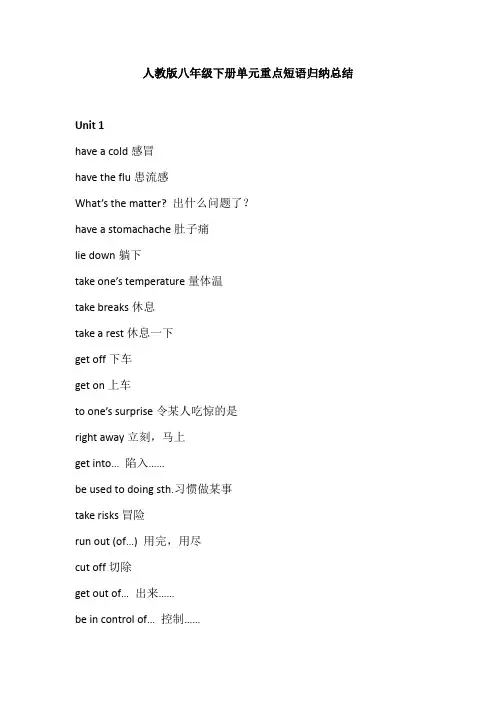
人教版八年级下册单元重点短语归纳总结Unit 1have a cold感冒have the flu患流感What’s the matter? 出什么问题了?have a stomachache肚子痛lie down躺下take one’s temperature量体温take breaks休息take a rest休息一下get off下车get on上车to one’s surprise令某人吃惊的是right away立刻,马上get into… 陷入……be used to doing sth.习惯做某事take risks冒险run out (of…) 用完,用尽cut off切除get out of… 出来……be in control of… 控制……give up放弃cut oneself切到某人自己see a dentist看牙医sound like… 听起来像……have a fever发烧on the weekend在周末thanks to… 幸亏……fall down摔倒get sunburned晒伤by oneself独自一人mountain climbing爬山make a decision做决定Unit 2clean up大扫除cheer up使振奋起来;喝彩give out分发come up with… 提出……,想出……put off推迟,拖延hand out分发call up打电话used to… 过去常常……care for… 关爱……try out尝试fix up修理give away捐赠set up建立make a difference起作用make plans做计划help out帮助a strong feeling of satisfaction强烈的满足感at the age of… 在几岁的时候at the same time同时put up搭建;张贴be worried about… 担心……raise money筹钱take after… 长得像……run out of… 用完……,用尽……Unit 3take out the rubbish倒垃圾all the time一直,总是as soon as… 一……就……in order to… 为了……,目的是……depend on… 依赖……,依靠……take care of… 照顾……do the dishes洗碗sweep the floor拖地make the bed整理床铺fold the clothes叠衣服clean the living room打扫客厅get a ride骑行at least至少at most至多take the dog for a walk遛狗shout back吼回去walk away走开a waste of time浪费时间do chores做家务Unit 4What’s wrong? 出什么问题了?look through… 浏览……big deal大事情,大问题work out 解决,计算出get on with… 相处……cut out切掉compare…with… 把……与……比较in one’s opinion在某人看来call up打电话talk about sth. with sb. on the phone通过电话与某人交谈某事give back归还sit down坐下communicate with… 与……交谈be oneself做自己play sports做运动hang out with friends和朋友闲逛Unit 5go off(闹铃)响了pick up捡起,拾起,(开车去)接,接电话fall asleep熟睡die down逐渐变弱,逐渐消失have a look看一看make one’s way前往,费力地前进in silence 沉默,无声take down拆除,往下拽,记录at first首先wait for… 等待……in the neighborhood在附近make sure确保,确信Unit 6turn…into… 把……转变成……once upon a time很久以前fall in love (with…) 爱上(……)get married结婚lead to… 导致……be moved by… 被……感动give up放弃give in屈服get/be lost迷路,丢失wake up醒来Unit 7feel free(可以)随便(做某事)as far as I know据我所知take in… 吸收……,吸入……in the face of… 面对……even though(if)即使,虽然at birth出生时up to… 到达……,至多有……walk into… 走路时撞着……fall over绊倒or so大约in the world在世界上take care of… 照顾……,照料……a symbol of… ……的标志every two years每两年,每个一年cut down砍倒,消减Unit 8be full of… 充满……,填满……hurry up快点be filled with… 填满……,充满……science fiction科幻小说country music乡村音乐ever since自从one another相互used to do… 过去常常……come to realize… 逐渐意识到……belong to… 属于……Unit 9amusement park娱乐公园tea art茶艺thousands of… 数以千计的……all year round一整年on the one hand在一方面on the other hand在另外一方面three quarters四分之三in the past在过去the Great Wall万里长城in a rapid way以一种飞快的方式Unit 10give away捐赠in need处于需要中welcome to… 欢迎……no longer不再as for… 至于……to be honest说实话part with… 分开……even though/if即使millions of… 数以百万计的……according to… 根据……look for… 寻找……go back返回across from… 在……对面in one’s opinion在某人看来。
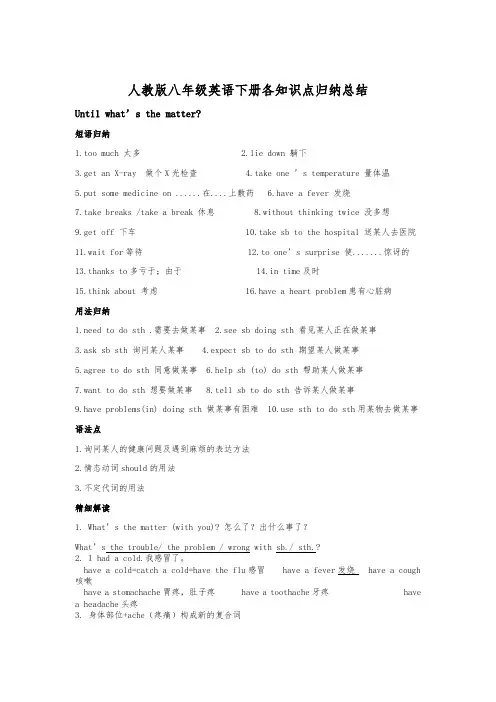
人教版八年级英语下册各知识点归纳总结Unti1 what’s the matter?短语归纳1.too much 太多2.lie down 躺下3.get an X-ray 做个X光检查4.take one ’s temperature 量体温5.put some medicine on ......在....上敷药6.have a fever 发烧7.take breaks /take a break 休息 8.without thinking twice 没多想9.get off 下车 10.take sb to the hospital 送某人去医院11.wait for等待 12.to one’s surprise 使.......惊讶的13.thanks to多亏于;由于 14.in time及时15.think about 考虑 16.have a heart problem患有心脏病用法归纳1.need to do sth .需要去做某事2.see sb doing sth 看见某人正在做某事3.ask sb sth 询问某人某事4.expect sb to do sth 期望某人做某事5.agree to do sth 同意做某事6.help sb (to) do sth 帮助某人做某事7.want to do sth 想要做某事 8.tell sb to do sth 告诉某人做某事9.have problems(in) doing sth 做某事有困难 e sth to do sth用某物去做某事语法点1.询问某人的健康问题及遇到麻烦的表达方法2.情态动词should的用法3.不定代词的用法精细解读1. What’s the matter (with you)? 怎么了?出什么事了?What’s the trouble/ the problem / wrong with sb./ sth.?2. I had a cold.我感冒了。

初二下册人教版英语重点词汇和句型总结-CAL-FENGHAI.-(YICAI)-Company One1八年级下英语短语及句型总结Unit 1短语及句型1.there will be 将会有There will be more people.将会有更多的人Will there be less pollution?会有更少的污染吗?Yes,there will.\ No,therewon’t.是,会有。
\ 不,不会有。
2.many\much---- more +可数或不可数名词更多few --- fewer + 可数名词更多little ----- less +不可数名词更少例如:more people、more pollution、less freetime、less pollution、fewer cars、fewer trees3.be free 免费的4. on computers 在电脑上on paper 在纸上5.live to be 活到live tobe 200 years old 活到200岁26.fall in love with sb.\sth.喜爱某人或某物7.live alone 单独居住8.on vacation 度假9.over and over again 一遍又一遍10.be the same as 与…一样be different from 与…不同unit 2 单词及短语1.What should I\he\she\they\you do 我\他\她\他们\你该怎么办You could write him aletter. 你可以给他写一封信。
2.argued with sb. 与某人争吵3.out of style 过时的instyle 时尚的4.a ticket to a ball game一场球赛的票5.surprise sb. 使某人惊奇be surprised at sth. 对…感到惊奇to one’s surprise 令某人惊奇的事6.pay for 支付37.ask sb. for sth. 向某人要求某物ask sb. to do sth. 要求某人做某事8.have a bake sale 烧烤9.find out 发现,查明10.get on well with sb. 与某人相处得好11.have a fight with sb. 与某人争吵、打架12.not……until 直到…才13.it’s time for sth.\it’stime to do sth. 做某事的时间到了14.under too muchpressure 承受太多的压力15.take part in 参加,参与16.a mother of three 三个孩子的妈妈Unit 3 短语及句型1.What were you doingwhen the UFO arrived当UFO到达时你在干什么?2.While the boy waswalking down the street,the UFO landed.4当男孩在沿着街道走时,UFO降落了3.in front of 在…之前(外部整体前)in the front of (内部整体前)4.talk on the phone 在电话中交谈nd on the street 在街上降落6.walk down the street 沿着街道走7.take off (过去式 took off)起飞8.around ten o’clock 大约10点9.You can imagine howstrange it was!你可以想象它有多奇怪!10.Museum of Flight 飞行博物馆11.jump down 跳下来12.in a tree 在树上on atree 长在树上13.run away 跑开,逃跑14.say to sb. 对某人说15.one of the mostimportant events 最重要的事件之一 (one of + 形容词最高级+名词复数) 最…之一16.in silence 无声的517.take place 发生(预先安排)happen 发生(偶然)18.have meaning to sb. 对…来说有意义Unit 4 短语及句型1.He said he was hard-working. 他说他努力学习了2.She said she was havinga party for Lana她说她为Lana举行了聚会3.mad at sb. 对某人生气4.first of all 首先5.pass sth. to sb. \ pass onsth. 传递某物6.be sppoused to 应该7.I’m better at readingthan listening. 我的阅读比听力好。
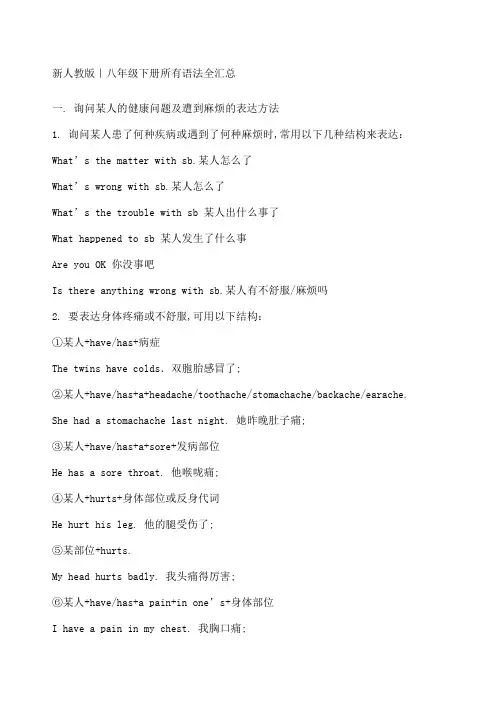
新人教版|八年级下册所有语法全汇总一. 询问某人的健康问题及遭到麻烦的表达方法1. 询问某人患了何种疾病或遇到了何种麻烦时,常用以下几种结构来表达:What’s the matter with sb.某人怎么了What’s wrong with sb.某人怎么了What’s the trouble with sb 某人出什么事了What happened to sb 某人发生了什么事Are you OK 你没事吧Is there anything wrong with sb.某人有不舒服/麻烦吗2. 要表达身体疼痛或不舒服,可用以下结构:①某人+have/has+病症The twins have colds.双胞胎感冒了;②某人+have/has+a+headache/toothache/stomachache/backache/earache. She had a stomachache last night. 她昨晚肚子痛;③某人+have/has+a+sore+发病部位He has a sore throat. 他喉咙痛;④某人+hurts+身体部位或反身代词He hurt his leg. 他的腿受伤了;⑤某部位+hurts.My head hurts badly. 我头痛得厉害;⑥某人+have/has+a pain+in one’s+身体部位I have a pain in my chest. 我胸口痛;⑦There is something wrong with one’s+身体部位There is something wrong with my right eye. 我的右眼有毛病;⑧其他表达方式She has a heart trouble. 她有心脏病;He got hit on the head. 他头部受到了撞击;She cut her finger. 她割破手指了;二. 情态动词should的用法1. should为情态动词,意为“应该;应当”,否定式为shouldn’t,其后接动词原形,无人称和数的变化;常用来表示征询意见、建议、劝告、要求或义务等;You should drink more water. 你应该多喝水;He should put his head back. 他应该把头后仰;We should try our best to help him. 我们应当尽力去帮助他; You shouldn‘t watch TV. 你不应该看电视;2. should用于主语为第一人称的疑问句,表示征询意见;Should I put some medicine on it 我应当给它敷上药吗Should we tell her about it 我们应该告诉她这件事吗3. 在英语中,表示建议的说法有很多,而且都是中考考查的重点;主要结构有:①Would you like to do sth你想要/愿意做某事吗Would you like to play basketball with me 你想要和我一起打篮球吗②Shall I/we do sth 我/我们做某事好吗Shall we go to the zoo tomorrow 明天我们去动物园,好吗③Why not do sth 为什么不......呢Why not join us为什么不加入到我们当中来呢④How/What about doing sth 做某事怎么样How about going swimming 去游泳怎么样⑤Let’s do sth. 让我们做......吧;Let’s go home. 咱们回家吧;⑥You’d better not do sth 你最好不要做某事;You’d better not go there alone. 你最好不要一个人去那儿;三. 反身代词英语中共有八个反身代词,在使用时应注意和它所指的相应的对象在人称、性别和数上保持一致;第一人称第二人称第三人称单数 myself yourself himself/herself/itself复数 ourselves yourselves themselves反身代词的用法1. 可用作宾语,指的是宾语和主语表示同一个或同一些人或事物;如:Maria bought herself a scarf.We must look after ourselves very well.2. 可用作表语,指的是表语和主语表示同一个或同一些人或事物;如: She isn’t quite herself today.3. 可用作主语或宾语的同位语,常用来加强语气;如:She herself will fly to London tomorrow.I met the writer himself last week.4. 用在某些固定短语当中;如:look after oneself / take care of oneself 照顾自己teach oneself sth./learn sth. by oneself 自学enjoy oneself 玩得高兴,过得愉快help oneself to sth 请自用……随便吃/喝些……hurt oneself 弄伤自己say to oneself 自言自语leave sb. by oneself 把某人单独留下注意反身代词不能单独做主语,但可以做主语的同位语,起强调作用;如:我自己能完成作业;误Myself can finish my homework.正I myself can finish my homework. / I can finish my homework myself.四. 一般将来时一般将来时表示将来某个时间要发生的动作或状态,或将来经常发生的动作或状态;一般将来时的基本结构1. will+动词原形否定式:will not=won't一般疑问式:will/shall+主语+动词原形+其他特殊疑问式:特殊疑问词+一般疑问式—Will he help you with your English tonight今天晚上他会帮助你学习英语吗—Yes, he will./No, he won't.是的,他会;/不,他不会;—When will you arrive for America你什么时候去美国—Tomorrow.明天;2. am/is/are going to +动词原形否定式:am/is/are not going to +动词原形一般疑问式:am/is/are +主语+ going to + 动词原形+其他特殊疑问式:特殊疑问词+一般疑问式Look at the dark clouds. There is going to be a storm.看那乌云,快要下雨了;Is he going to collect any data for us他会帮我们收集数据吗What are you going to do tomorrow明天你打算作什么3. will+动词原形与am/is/are going to +动词原形的用法区别will+动词原形与am/is/are going to +动词原形的用法虽然都表示将来发生动作或情况,一般情况下能互换;但它们的用法是有区别的;will主要用于在以下三个方面:1表示主观意愿的将来;They will go to visit the factory tomorrow.明天他们将去厂参观工厂;2表示不以人的意志为转移的客观的将来;He will be thirty years old this time next year.明年这个时候他就将三十岁;3表示临时决定,通常用于对话中;—Mary has been ill for a week.玛丽病了一周了;—Oh, I didn't know. I will go and see her.噢,我不知道;我去看看她;be going to主要用于以下两个方面:1表示事先经过考虑、安排好打算、计划要做某事;Dad and I are going to watch an opera this afternoon.今天下午我和爸爸打算去看歌剧;2表示根据目前某种迹象判断,某事非常有可能发生,表示推测;Look There come the dark clouds. It is going to rain.瞧乌云密集;天要下雨了;五. 动词不定式to do的用法1. 作主语为避免句子的头重脚轻,常用it作为形式主语,而真正的主语动词不定式后置; 常用句型:It +be+adj./n.+for/of sb. to do sth./It takes sb. some time to do sth.2. 作宾语动词want, decide, hope, ask, agree, choose, learn, plan, need, teach, prepare常接动词不定式作宾语;3. 作后置定语常用于“have/has+sth.+to do”或“Its time to do sth.”等结构中;4. 作宾语补足语tell, ask, want, invite, teach, like, call等可接带to的动词不定式作宾语补足语,构成tell/ask/want /call/invite sb. to do sth.结构;注意动词不定式作使役动词和感官动词的宾语补足语时应省去to:“一感feel,二听listen to, hear,三让let, make, have,四看look at, see, watch, notice,半帮助help”;5. 动词不定式作状语主要用来修饰动词,表示目的,结果或原因;为了强调目的,有时可以把动词不定式放在句首,或在不定式前加in order to 或so as to “为了,目的是”;六. Could you please...句型1. 请求别人时通常用此句型,也可以说Can you...please情态动词could或can 在这里均表示请求,在意思上无区别,但是用could在于其显得更委婉、客气、诚恳;在日常生活中常使用could you/I...若在句末加上please,则显得更礼貌; Could you help me find my book, please你能帮我找到我的书吗2. 对could you/I...的问句作出肯定回答,常用“sure/certainly/of course”等;如果作否定回答,常用“sorry或oh, please don’t”; 一般不用no开头,用no显得语气生硬、不礼貌;3. 表示请求的其他句式Would you like to do...Would you mind doing...Let’s do....Please do...祈使句前加please七. 过去进行时1. 基本概念:过去进行时表示在过去某一时刻或一段时间内正在进行的动作;这一特定的过去时间除有上下文暗示以外, 一般用时间状语来表示;常用的时间状语this morning, the whole morning, all day yesterday, from nine to ten last evening, when, while等;We were watching TV from seven to nine last night.昨天晚上七点到九点的时候我们在看电视;It was raining when they left the station.他们离开车站的时候天正在下雨;2. 基本结构 was / were not + 动词-ing3. 一般过去时与过去进行时用法的比较一般过去时表示在过去某个时间发生过的动作或存在的状态, 而过去进行时则表示在过去某一时刻或某一段时间正在进行的动作;David wrote a letter to his friend last night. 大卫昨晚给他的朋友写了封信;信写完了;David was writing a letter to his friend last night. 大卫昨晚一直在给他的朋友写信;信不一定写完;八. 状语从句1. unless引导条件状语从句unless = if...not... 除非,若不They will go tomorrow unless it rains.= They will go tomorrow if it doesn’t rains.2. as soon as引导时间状语从句,意为“一...就...”;He will come and see you as soon as he can.3. so...that...引导结果状语从句句型1:主语+谓语+so+形容词/副词+that从句The wind was so strong that we could hardly move forward. 句型2: so +形容词 + a/an + 单数名词 + that从句It was so hot a day that they all went swimming.句型3. so + many/ few + 复数名词 + that从句He has so few friends that he often feels lonely.句型4: so +much/ little + 不可数名词 + that 从句I had so little money that I couldn’t buy a pen.九. 形容词/副词的比较等级形容词和副词有三个比较等级,即原级也就是原形、比较级表示“较……”或“更……”的意思,用于两者之间比较和最高级表示“最……”的意思,用于三者或三者以上的比较;1. 形容词/副词的比较级和最高级的规则变化1单音节词和少数以-er,-ow结尾的双音节单词,比较级在后面加-er,最高级在后面加-est;①单音节单词small→smaller→smallestshort→shorter→shortesttall→taller→tallestgreat→greater→greatest②少数以-er,-ow结尾的双音节单词clever→cleverer→cleverestnarrow→narrower→narrowest2以不发音e结尾的单音节单词,比较级在原形后加-r,最高级在原级后加-st; large→larger→largestnice→nicer→nicestable→abler→ablest3以一个辅音字母结尾的闭音节即:辅音+元音+辅音单词中,先双写末尾的辅音字母,比较级加-er,最高级加-est;big→bigger→biggesthot→hotter→hottestfat→fatter→fattest4以“辅音字母+y”结尾的双音节词, 把y改为i,比较级加-er,最高级加-est; easy→easier→easiestheavy→heavier→heaviestbusy→busier→busiesthappy→happier→happiest5其他双音节词和多音节词,比较级在前面加more,最高级在前面加most; beautiful→more beautiful→most beautifuldifferent→more different→most differenteasily→more easily→most easily2. 形容词/副词的比较级和最高级的不规则变化good→better→bestwell→better→bestbad→worse→worstill→worse→worstold→older/elder→oldest/eldestmany/much→more→mostlittle→less→leastfar →further/farther→ furthest/farthest3. 原级常用句型1A is as+原级+ as+ B 表示A与B一样...eg. He is as tall as me.2A is not as/so +原级+ as B 表示A不如B...eg. He is not as tall as me.3只能修饰原级的词,very,quite,so,too,so,enough,pretty等 ; eg. He is too tired to walk on.他太累了以至于不能再继续走了;4. 比较级常用句型1当句中有than时则用比较级;eg. He is fatter than me.2“特殊疑问词+be+形容词比较级,A or B ”eg. Which is bigger,the earth or the moon哪一个更大,地球还是月球3“比较级+and+比较级”表示“越来越...”;eg. The flowers are more and more beautiful.花儿越来越漂亮;English is more and more important. 英语越来越重要了;4“the+比较级,the+比较级”表示“越...,越...”;eg. The more careful you are,the fewer mistakes you’ll make.5可以修饰比较级的词:much,a lot,far,a little,a bit,even,still等;eg. Lesson One is much easier than Lesson Two. 第一课比第二课容易得多;5. 最高级常用句型1.“主语+be+the+形容词最高级+单数名词+in/of...”表示“……是……中最……的”;Tom is the tallest in his class/of all the students.汤姆是他们班上/所有学生当中最高的;2.“主语+实意动词+the+副词最高级+in/of...”表示“……是……中最……的”;I jump the farthest in my class.我是我们班跳得最远的;3.“主语+be+one of the+形容词最高级+复数名词+in/of...”表示“……是……中最……之一”;Beijing is one of the largest cities in China.北京是中国最大城市之一;4.“特殊疑问词+be+the+最高级,甲,乙,or丙”用于三者或三者以上的比较; Which country is the largest,China,Brazil or Canada哪个国家最大,中国,巴西还是加拿大5.“特殊疑问词+助动词+主语+the+副词最高级+甲,乙,or丙”用于三者或三者以上的比较;Which season do you like the best,spring,summer or autumn你最喜欢哪一个季节,春天,夏天还是秋天注意:副词最高级用在句中时,其前可以加the,也可以不加;但形容词最高级用在句中时,其前一般都要加the;十. 现在完成时一. 现在完成时基本结构①肯定句:主语+have/has+动词的过去分词②否定句:主语+have/has+not+动词的过去分词③一般疑问句:Have/Has+主语+动词的过去分词④特殊疑问句:特殊疑问词+一般疑问句have/has+主语+过去分词二. 现在完成时用法1. 现在完成时用来表示过去已经完成的动作对现在造成影响或后果;也就是说,动作或状态发生在过去但它的影响现在还存在,强调的是现在;I have already posted the photo.我已经邮寄出了照片;与此种用法连用的时间状语时一些模糊的过去时间状语,如already肯定句, yet 否定句/疑问句, just, before, recently,still, lately,never等;2. 现在完成时也可用来表示动作或状态发生在过去某一时刻,持续到现在并且有可能会继续持续下去;He has lived here since 1978.自从1978年以来,他一直住在这儿;动作起始于1978年,一直住到现在,可能还要继续住下去;此种用法常与for+时间段,since+时间点或过去时的句子连用;谓语动词必须是延续性动词;有些瞬间动词可变为延续动词:go out----be outfinish----be overopen----be opendie----be deadbuy---havefall ill---be illcome back----be backcatch a cold----have a cold。
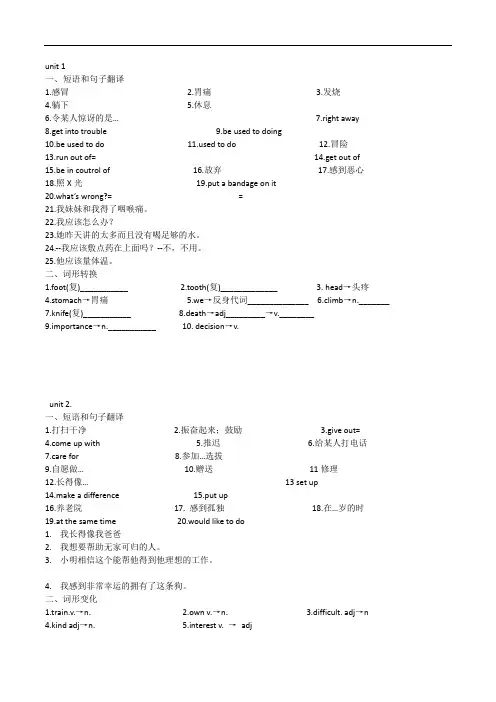
一、短语和句子翻译1.感冒2.胃痛3.发烧4.躺下5.休息6.令某人惊讶的是…7.right away8.get into trouble 9.be used to doing10.be used to do ed to do 12.冒险13.run out of= 14.get out of15.be in coutrol of 16.放弃17.感到恶心18.照X光19.put a bandage on it20.what’s wrong?= =21.我妹妹和我得了咽喉痛。
22.我应该怎么办?23.她昨天讲的太多而且没有喝足够的水。
24.--我应该敷点药在上面吗?--不,不用。
25.他应该量体温。
二、词形转换1.foot(复)___________2.tooth(复)_____________3. head→头疼4.stomach→胃痛5.we→反身代词______________6.climb→n._______7.knife(复)___________8.death→adj_________→v.________9.importance→n.___________ 10. decision→v.unit 2.一、短语和句子翻译1.打扫干净2.振奋起来;鼓励3.give out=e up with5.推迟6.给某人打电话7.care for 8.参加…选拔9.自愿做…10.赠送11修理12.长得像…13 set up14.make a difference 15.put up16.养老院17. 感到孤独18.在…岁的时19.at the same time 20.would like to do1.我长得像我爸爸2.我想要帮助无家可归的人。
3.小明相信这个能帮他得到他理想的工作。
4.我感到非常幸运的拥有了这条狗。
二、词形变化1.train.v.→n.2.own v.→n.3.difficult. adj→n4.kind adj→n.5.interest v. →adj一、短语和句子翻译1.take out the rubbish2.反复;频繁3.一…就…4.做家务5. in order to6.depend on7.take care of8.do the dishes9.make one’s bed10.fold one’s clothes 11.扫地12.clean the living room 13.没问题14.get a ride 15. at least →反16.any minute 17.be always doing 18.mind doing 19.have a test 20.invite sb to a party21.hang out with sb. 22.as a result23.spend time on sth24--我可以和我的朋友外出就餐吗?--好的,没问题。
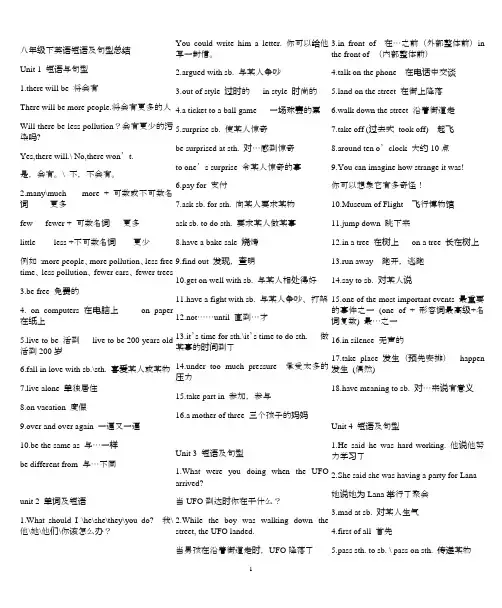
八年级下英语短语及句型总结Unit 1 短语与句型1.there will be 将会有There will be more people.将会有更多的人Will there be less pollution?会有更少的污染吗?Yes,there will.\ No,there won’t.是,会有。
\ 不,不会有。
2.many\much---- more + 可数或不可数名词更多few --- fewer + 可数名词更多little ----- less +不可数名词更少例如:more people、more pollution、less free time、less pollution、fewer cars、fewer trees3.be free 免费的4. on computers 在电脑上on paper 在纸上5.live to be 活到live to be 200 years old 活到200岁6.fall in love with sb.\sth. 喜爱某人或某物7.live alone 单独居住8.on vacation 度假9.over and over again 一遍又一遍10.be the same as 与…一样be different from 与…不同unit 2 单词及短语1.What should I \he\she\they\you do? 我\他\她\他们\你该怎么办?You could write him a letter. 你可以给他写一封信。
2.argued with sb. 与某人争吵3.out of style 过时的in style 时尚的4.a ticket to a ball game 一场球赛的票5.surprise sb. 使某人惊奇be surprised at sth. 对…感到惊奇to one’s surprise 令某人惊奇的事6.pay for 支付7.ask sb. for sth. 向某人要求某物ask sb. to do sth. 要求某人做某事8.have a bake sale 烧烤9.find out 发现,查明10.get on well with sb. 与某人相处得好11.have a fight with sb. 与某人争吵、打架12.not……until 直到…才13.it’s time for sth.\it’s time to do sth. 做某事的时间到了14.under too much pressure 承受太多的压力15.take part in 参加,参与16.a mother of three 三个孩子的妈妈Unit 3 短语及句型1.What were you doing when the UFOarrived?当UFO到达时你在干什么?2.While the boy was walking down the street, the UFO landed.当男孩在沿着街道走时,UFO降落了3.in front of 在…之前(外部整体前)in the front of (内部整体前)4.talk on the phone 在电话中交谈nd on the street 在街上降落6.walk down the street 沿着街道走7.take off (过去式took off) 起飞8.around ten o’clock 大约10点9.You can imagine how strange it was!你可以想象它有多奇怪!10.Museum of Flight 飞行博物馆11.jump down 跳下来12.in a tree 在树上on a tree 长在树上13.run away 跑开,逃跑14.say to sb. 对某人说15.one of the most important events 最重要的事件之一(one of + 形容词最高级+名词复数) 最…之一16.in silence 无声的17.take place 发生(预先安排)happen发生(偶然)18.have meaning to sb. 对…来说有意义Unit 4 短语及句型1.He said he was hard-working. 他说他努力学习了2.She said she was having a party for Lana她说她为Lana举行了聚会3.mad at sb. 对某人生气4.first of all 首先5.pass sth. to sb. \ pass on sth. 传递某物6.be sppoused to 应该7.I’m better at reading than listening. 我的阅读比听力好。
人教版八年级英语下册各单元知识点梳理汇总Unit 1一、重点短语1.have a fever发烧2.have a cough咳嗽3.have a toothache牙疼4.talk too much说得太多5.drink enough water喝足够的水6.have a cold受凉;感冒7.have a stomachache胃疼8.have a sore back背疼9.have a sore throat喉咙痛10.lie down and rest躺下来休息11.hot tea with honey加蜂蜜的热茶12.see a dentist看牙医13.get an X-ray拍X光片14.take one’s temperature量体温15.put some medicine on sth在……上面敷药16.feel very hot感到很热17.sound like听起来像18.all weekend整个周末19.in the same way以同样的方式20.go to a doctor看医生21.go along沿着……走22.on the side of theroad在马路边23.shout for help大声呼救24.without thinking twice没有多想25.get off下车26.have aheart problem有心脏病27.to one’s surprise使……惊讶的28.thanks to多亏了;由于29.in time及时30.save a life挽救生命31.get into trouble造成麻烦32.right away立刻;马上33.because of由于34.get out of离开35.hurt oneself受伤36.put a bandage on sth.用绷带包扎37.fall down摔倒38.feel sick感到恶心39.have a nosebleed流鼻血40.cut his knee割伤他的膝盖41.put her head back把她的头向后仰42.have problems breathing呼吸困难43.mountain climbing登山运动44.be used to doing sth.习惯做某事45.run out(of)用完;用尽46.so that以便47.so…that如此……以至于……48.be in control of掌管;管理49.in a difficult situation在逆境屮50.keep on doing sth.坚持做某事51.make a decision做出决定52.take risks冒险53.give up放弃二、重点句型1.You need to take breaks away from the computer.你需要远离电脑,休息一下。
人教版英语八年级下册重点短语和总结Unit 1❋Section A❋1.have a cold / XXX /heart problem感冒/发烧/流鼻血/胃痛/背疼/嗓子疼/有心脏病2.take breaks / take a break休息3.right away立即;马上4.lie down躺下5.get into陷入;参与6.get off下车7.take one’s temperature量体温8.to one’s surprise使……惊讶的;出乎……意料9.think twice再三考虑10.put some medicine on the cut在伤口上敷点药11.get an X-ray做X光搜检12.in the same way以相同的方式13.agree to do XXX同意做某事14.XXX to多亏;由于15.in time实时16.fall down突然倒下;跌倒;倒塌❋Section B❋1.be used to (doing) sth.气于(做)某事;顺应于(做)某事2.take risks / take a risk冒险3.run out (of sth.)用完(某物)4.cut off切除5.give up放弃6.get out of分开;从……出来7.be in control of掌管;管理8.rest for a few days苏息几天9.get XXX晒伤10.get hit on the head头部遭到撞击111.have problems breathing呼吸困难12.get hit XXX被球击中13.XXX落空生命14.between a rock and a hard place左右为难;进退两难15.make a XXX做决定16.save one’s life救某人的命Unit 2❋Section A❋1.clean up清扫(或肃清)洁净2.cheer up (使)变得更高兴;振奋起来3.give out分发;散发4.put off推延e up with想出;提出(主见、打算、回覆等)6.hand out分发7.care for照顾;非常喜欢8.call up打电话给(某人);征召ed to曾经……;过去……10.try out参加……选拔;试用11.help out (帮助……)分担工作;解决难题12.look ofjoy on one’s face某人脸上喜悦的表情13.at the age of ...在……岁时14.go on a different journey进行一次不同的旅行15.by oneself独自;单独16.give up放弃17.a dream come true梦想成为现实;梦想成真18.XXX.自愿做某事19.at the same time同时2❋Section B❋1.give away赠送;捐赠2.take after (外貌或行为)像3.make a difference (to)(对……)影响;有感化4.fix up修理;装饰5.be similar to与……相像的、相似的6.XXX接德律风7.at once立即;立时8.set up建起;设立9.XXX改动我的糊口10.disabled people残疾人11.be strong in强项是……12.do XXX做志愿工作Unit 3❋Section A❋1.take out the rubbish倒渣滓2.all the time频仍;重复at least最少3.XXX……就……4.do XXX洗濯餐具5.sweep the floor扫地6.get a ride搭便车7.fold one’XXX叠衣服8.make one’s bed铺床9.throw down扔下10.clean the living room打扫客厅11.go out for XXX外出就餐12.stay out XXX在外呆到很晚13.in surprise诧异地14.do chores做家务15.have XXX举行一场篮球赛316.help out with sth.帮助做某事17.watch this show看这个表演18.take the dog for a walk遛狗19.pass me the salt把盐递给我20.lend me some money借给我一些钱❋Section B❋1.in order to目的是;为了2.as a result成效3.depend on依靠;信赖4.fall ill抱病5.take care of照顾;处理6.XXX a party约请我的同伙来插手集会7.a waste of time浪费时间8.spend ... on ...在……上花……(工夫、款项)9.get good grades获得好成就10.et into a good university进入一所好大学11.XXX.给某人提供某物12.mind XXX.XXX做某事13.develop one’s XXX造就或人的自力性14.XXX them how to look after XXX教他们若何照应本人15.understand the idea of fairness理解公平的概念16.learn to be independent学会自力Unit 4❋Section A❋1.XXX快速检察;欣赏2.big XXX紧张的事3.work out成功地发展;解决4.get on with和睦相处;关系良好45.allow sb. to do sth.允许某人做某事6.after-school classes课外班7.get into a fight参与/卷入打架中8.have a fight with ...与……打斗9.XXX归还某物10.be angry with sb.生或人的气11.refuse to do XXX.拒绝做某事12.offer to do XXX发起或自动提出做某事13.mind XXX.XXX或人做某事14.XXX和某人交流15.copy one’XXX抄或人的功课16.be afraid of ...害怕……17.speak in front of people在众人面前发言❋Section B❋1.cut out删除;删去pare ... with比较;对比3.XXX……看4.XXX ...和……合作5.exam skills考试技能6.get into a good high school一所好高中7.have a quick XXX迅速地吃晚饭8.push sb. so hard把某人逼得太紧9.cause a lot of stress造成许多压力10.give sb. a lot of pressure给某人施加很大压力11.XXX after-school activities参加课外活动12.from a young age从很小的年岁起5Unit 5❋Section A❋1.go off (闹钟)收回响声2.wake up醒来3.pick up (= pick up the phone)接电话4.at first起初;起先5.have a look看一看6.fall asleep进入梦境;睡着7.die down逐渐变弱;逐渐消失8.miss the bus误了大众汽车9.wait for the bus等公共汽车10.walk home步行回家11.in a mess一团糟12.take a hot shower洗热水澡13.XXX使人与人之间的干系更密切14.beat heavily against the windows强烈地敲打在窗户上15.play a card game玩纸牌游戏16.leave the house分开家17.clean up清扫(或肃清)洁净18.turn on the radio打开收音机19.take the car to the car wash把车送到洗车处20.You’re kidding!你在恶作剧!❋Section B❋1.make one’sway前去;辛苦地进步2.in silence沉默;无声3.point out指出4.XXX down撤除;往下拽;记实5.by the side of the road在马路边6.walk by走过;路过7.in history史上8.hear XXX听到这个消息69.for example例如10.tell XXX说真话11.the rest of ...残剩的……12.XXX.记得做了某事13.look out of the window看窗外14.have trouble (in) XXX.做某事有困难15.XXX XXX插手钢琴竞赛Unit 6❋Section A❋1.a little bit有点儿;稍微2.turn ... into变成3.instead of代替;反而4.get married结婚5.once upon a time早年6.fall in love with爱上……;喜爱上……7.work on处置(某事情);努力于8.XXX……就……9.XXX继续移山10.XXX拿走11.try to do sth.设法做某事12.a good way to solve his problem办理他的题目标一个好举措13.agree with赞成;附和14.for example例如15.build a road修一条路16.give up放弃17.be able to do sth.能够做某事18.for the first time初次;第一次19.main character主要角色20.in fact确切地说;事实上;实际上21.look like看起来像722.think of以为;想起23.fight bad people与坏人作斗争e out出来;出书25.XXX ...对……变得感乐趣26.help the weak帮助弱者27.one of the most popular stories最受欢送的故事之一28.all over the world全天下29.be new to ...初见的;不熟悉的❋Section B❋1.live near a forest住在森林附近2.the whole family全家3.wake up醒来4.make a plan制定打算5.in the moonlight在月光下6.along the way沿着这条路7.go out外出(娱乐)8.get lost迷路9.XXX赏月10.on the ground在地上11.find out查明;弄清12.never mind (用于安慰)没关系13.lead sb. to ...率领或人去……14.made of由……制成的15.change his plan改变他的计划8Unit 7❋Section A❋1.feel free (to do sth.) (可以)随便(做某事)2.as far as I know就我所知3.take in吸入;吞入(体内)4.in the face of面对(问题、困难等)5.even though / even if纵然;固然6.the XXX Ocean太平洋7.XXX meters平方米8.salt lakes咸水湖9.XXX最多的人口10.risk one’slife冒着生命风险11.one of the main reasons首要缘故原由之一12.challenge oneself挑战自我13.XXX’s dream完成或人的XXX14.the forces of nature大自然的力量❋Section B❋1.at XXX出身时2.die from死于3.walk into走路时撞着4.up to抵达(某数目、水平等);最多有;未几于5.with XXX兴奋地6.prepare ... for ...为……准备……7.or so约莫8.fall over绊倒9.take care of照顾;处理10.in fact确切地说;事实上;实际上11.cut down砍倒12.do research做研究13.a symbol of China中国的意味14.send ... to ...派……到……915.stop putting rubbish into the sea停止向海里倒垃圾16.in XXX处于风险当中17.protect ... from ...保护……不受……的侵害18.be special to ...对……很紧张19.XXX.花费……做某事Unit 8❋Section A❋1.full of满是……的;(有)大量的;(有)丰富的2.hurry up从速;仓卒(做某事)3.science fiction科幻小说(或影片等)4.grow up长大;成熟;成长5.put down放下6.at least最少7.XXX丧生8.write a book report写读书报告9.wait for期待;等待10.build a house盖房子11.arrive on this island到达这个岛上12.cut down trees砍伐树木13.give up摒弃14.the marks of ...……的迹象15.not long after that那之后不久16.try to do sth.试图做某事17.one ... the other ...一个……,另外一个……18.a piece of land一块地19.be interested in ...对……感兴趣20.can’t wait to do sth.迫不及待地想做某事❋Section B❋1.ever since自从12.one another互相ed to do sth.曩昔经常做某事4.XXX因某事和某人争辩5.XXX逐渐意识到6.XXX属于7.country music乡村音乐8.such as例如;像……这样9.do some research on ...做一些关于……的研究10.one of the most XXX美国历史上最成功的音乐家之一11.sing live现场演唱12.the number of ...……的数目13.introduce ... to ...把……介绍给……14.at the end of ...在……结尾;在……末端15.XXX ... XXX插手……俱乐部16.take French classes上法语课17.bring sb. back to ...把某人带回到……Unit 9❋Section A❋1.XXX2.water park水上公园3.tea art茶艺4.amusement park游乐场5.lead to导致6.a couple of两个;一对;几个7.take the XXX乘地铁8.XXX在山里宿营9.put up a XXX搭一顶帐篷1110.in such a rapid way以如此快速的方式11.in the XXX将来12.go skating去溜冰13.XXX’t XXX不敢信赖我的眼睛14.different kinds of不同种类的15.XXX鼓励某人做某事16.XXX收集茶具❋Section B❋1.thousands of数以千计的;许许多多的2.XXX度假3.on the one hand ... on the other hand ...一方面……另一方面……4.an English-XXX一个讲英语的国家5.whether ... or ...不管……还是……6.during XXX白天期间7.all year round整年8.close to接近Unit 10❋Section A❋1.yard sale庭院拍卖会2.XXX有点儿3.XXX唤起甜蜜的回忆4.give away赠送;捐赠5.people in need需要帮助的人6.XXX老虎7.soft toy软体玩具;布绒玩具8.a couple of两个;一对;几个9.give up放弃10.no longer不再;不复11.for a while一会儿12.clear out清理;丢掉1213.XXX out察看;观察14.for example例如15.board game棋类游戏16.at first起初;起先17.grow up长大;成熟;成长18.as for至于;关于19.bread maker面包机20.junior high school低级中学21.part with放弃、交出(尤指不舍得的东西)22.to XXX说实在23.one of the oldest buildings最古老的建筑之一❋Section B❋1.XXX2.search for work找事情3.at least最少;很多于;最少lions of大量5.in order to目标是;为了6.for the last ... years在过去的……年里7.It’s a shame.很遗憾。
新人教版|八年级下册所有重点单词、短语和句型全汇总Unit1 What’s the matter?【重点单词】matter [?m?t?] v. 重要,要紧,有关系What’s the matter? 怎么了?出什么事了?sore [s?:(r)] adj. 疼痛的,酸痛的have a cold 感冒stomach ['st?m?k] n. 胃,腹部stomachache ['st?m?ke?k] n. 胃痛,腹痛have a stomachache 胃痛foot(复数feet) [fu:t] n. 脚neck [nek] n. 颈,脖子throat [θr??t] n. 喉咙fever ['fi:v?] n. 发烧,发热lie [la?] v. 躺,平躺lie down 躺下rest [rest] n. 剩余部分,其余;放松,休息cough [k?f] n. & v. 咳嗽X-ray ['eksre?] n. X光,X射线toothache [?tu:θe?k] n. 牙痛take one's temperature 量体温headache [?hede?k] n. 头痛have a fever 发烧break [bre?k] n. & v. 休息,暂停;打破take breaks (take a break)休息hurt [h?:t] v. 伤害,损害,使受伤passenger ['p?s?nd??] n. 乘客,旅客off [?f] adv. prep. 离开(某处);从…去掉get off 下车to one's surprise 使…惊讶,出乎…意料onto [??nt?] prep. 向,朝trouble [?tr?bl] n. 麻烦,烦扰,问题hit [hit] n. & v. 碰撞,打,打击right away 立即,马上get into 陷入,参与herself [h?:?self] pron. 她自己,她本身(she的反身代词)bandage ['b?nd?d?] n. & v. 绷带;用绷带包扎sick [s?k] adj. 患病的,不适的knee [ni:] n. 膝盖nosebleed [?n??zbli:d] n. 鼻出血breathe [bri:e] v. 呼吸sunburned [?s?nb?:nd] adj. 晒伤的ourselves [ɑ:?selvz] pron. 我们自己(we的反身代词)climber [?kla?m?(r)] n. 登山者be used to 习惯于…适应于…risk [r?sk] n. & v. 风险,危险;冒险take risks (take a risk) 冒险accident [??ksid?nt] n. 意外事件;事故situation [?sitju?ei??n] n. 状况,形式,情况kg=kilogram [?k?l?gr?m] n. 公斤,千克rock [r?k] n. 岩石run out (of) 用尽,耗尽knife [naif] n. 刀,餐刀cut off 切除blood [bl?d] n. 血mean [mi:n] v. 意味着,意思是,意欲get out of 离开,从…出来importance [?m?p?:tns] n. 重要性decision [d?'s??n] n. 决心,决定,抉择control [k?n'tr??l] v. 控制,支配,操纵be in control of 掌管,管理spirit ['sp?r?t] n. 勇气,意志death [deθ] n. 死亡give up 放弃nurse [n?:s] n. 护士【重点短语】1.have a fever 发烧2.have a cough 咳嗽3.have a toothache 牙疼4.talk too much 说得太多5.drink enough water 喝足够的水6.have a cold 受凉;感冒7.have a stomachache 胃疼8.have a sore back 背疼9.have a sore throat 喉咙痛10. take risks 冒险11.hot tea with honey 加蜂蜜的热茶12.see a dentist 看牙医13.get an X-ray 拍X 光片14.take one’ s temperature 量体温15.put some medicine on sth. 在……上面敷药16. give up 放弃17. sound like 听起来像18. all weekend 整个周末19. in the same way 以同样的方式20. go to a doctor 看医生21. go along 沿着……走22. on the side of the road 在马路边23. shout for help 大声呼救24. without thinking twice 没有多想25. get off 下车26. have a heart problem 有心脏病27. to one’ s surprise 另某人惊讶的是28. thanks to 多亏了;由于29. in time 及时30. make a decision 做出决定31. get into trouble 造成麻烦32. right away 立刻;马上33. because of 由于34. get out of 离开;从……出来35. keep on doing sth. 继续或坚持做某事36. put a bandage on sth. 用绷带包扎37. fall down 摔倒38. feel sick 感到恶心39. have a nosebleed 流鼻血40. cut his knee 割伤他的膝盖41. put her head back 把她的头向后仰42. have problems breathing 呼吸困难43. mountain climbing 登山运动44. be used to doing sth. 习惯做某事45. run out (of) 用完;用尽46. so that 以便47. so...that... 如此……以至于...…48. be in control of 掌管;管理49. in a difficult situation 在闲境中【重点句型】1. What's the matter with you?= What'the trouble with you?= What's wrong with you? 你怎么了?2. What should she do? 她该怎么办呢?3.Should I take my temperature? 我应该量一下体温吗?4.You should lie down and rest. 你应该躺下休息一会儿。
《新人教版八年级下册》英语书共分为十个单元,共415个单词和短语。
2014八年级人教版下。
1Unit 1What's the matter?1 matter n.问题,事情2 What's the matter ? 怎么了? 出什么事了?3 sore adj.疼痛的,酸痛的4 have a cold 感冒5 stomachache n.胃痛,腹痛6 have a stomachache 胃痛7 foot n.足,脚8 neck n.颈,脖子9stomach n.胃,腹部10 throat n.咽喉,喉咙11 fever n.发烧12lie v.躺,平躺13 lie down 躺下14rest v&n.放松,休息15 cough v.咳嗽16 X-ray n. X射线,X光16 toothache n.牙痛18 take one's temperature 量体温19 headache n.头痛20 have a fever 发烧21breakn.间歇;休息22 take breaks(take a break) 休息23 hurt v.(使)疼痛,受伤24 passenger n.乘客,旅客25 off adv.&prep. 离开(某处);不工作;从……去掉26 get off 下车27 to one's surprise 使……惊讶的,出乎……意料28 onto prep.向;朝29 trouble n. 问题,苦恼30 hit v.(用手或器具)击,打31 right away 立即;马上32 get into 陷入;参与33 herself pron.(she的反身代词)她自己34 bandage n.绷带v.用绷带包扎35 sick adj.生病的;有病毒36 knee n.膝盖,膝37 nosebleed n.鼻出血38 breathe n.呼吸39 sunburned adj.晒伤的40 ourselves pron.(we的反身代词)我们自己,自己41 climber n.登山者;攀登者42 be used to 习惯于……,适应于……43 risk n&v.危险,风险44 take risks (take a risk)冒险45 accident n.(交通)事故;意外遭遇46 situation n.情况,状况47 kilo (=kilogram) n.千克48 rock n.岩石49 run out (of) 耗尽50 knife n.(pl.knives) 刀51 cut off 切除52 blood n.血53 mean v.意思是,打算,意欲54 get out of 离开,从……出来55 importance n.重要性,重要56 decision n.决定,抉择57 control n.﹠v.限制,约束,管理58 be in control of 掌管,管理59 spirit n.勇气,意志60 death n.死,死亡61 give up 放弃62 nurse n.护士2Unit 2I'll help to clean up the parks.1 clean up 打扫(或清除)干净2 cheer v.欢呼,喝彩3 cheer up (使)变得更高兴,振奋起来4 give out 分发,散发5 volunteer v.义务做,自愿做n.自愿者6 notice n.公告牌,通告,布告7 used to 曾经……,过去……8 lonely adj.孤独的,寂寞的9 several pron 几个,数个,一些10 feeling n.感觉,感触11 satisfaction n.满足,满意12 joy n.高兴,愉快13 owner n.物主,主人14 journey n.(尤指长途)旅行,行程15 sign n.标志,信号16 sick adj.生病的,有病的17 raise v.募集,征集18 alone adv.独自,单独lonely adj. 孤独19 repair v.修理,修补20 fix v.安装,使固定21 give away 赠送,捐赠22 wheel n.车轮,轮子23 letter n.信,函24 miss n.女士,小姐25 set up 建起,设立26 make a difference 影响,有作用27 blind adj.瞎的,失明的28 deaf adj.聋的29 imagine v.﹠n.想象,设想30 difficulty n.困难,难题31 open v.开,打开32 door n.门33 carry v.拿,提,扛34 train v.训练,培训35 excited adj.激动的,兴奋的36 training n.训练,培训37 kindness n.仁慈,善良38 clever adj.聪明的,聪颖的39 understand v.理解,领会40 change v.变化,改变41 disabled adj.丧失能力的,有残疾的42 strong adj.强壮的,强健的43 sir n.先生44 madam n.夫人,女士3Unit 3Could you please clean your room?1 rubbish n.垃圾;废弃物2 take out the rubbish 倒垃圾3 fold v.折叠;对折4 sweep v.扫;打扫5 floor n. 地板6 mess n.杂乱;不整洁7 throw v.扔;掷8 all the time 频繁;反复9 neither adv.也不10 shirt n.衬衫11 pass v.给;递;走过;通过12 borrow v.借;借用13 lend v.借给;借出14 finger n.手指15 hate v.厌恶;讨厌16while conj.在……期间;当……的时候17 snack n.点心;小吃;快餐18 chore n.杂务;乏味无聊的工作19 stress n.精神压力;心理负担20 waste n.浪费;滥用21in order to 目的是;为了22provide v.提供;供应23 anyway adv.而且;加之24 depend v.依靠;信赖25 depend on 依靠;信赖26 develop v.发展;壮大27 fairness n.公平性;公平合理性28 since conj.从……以后;自……以来29 neighbor (=neighbour) n.邻居30 result n.后果;结果31 ill adj.有病;不舒服32 drop v.落下;掉下33 independence n.独立34 independent adj.独立的;自主的35 take care of 照料;爱护36 fair adj. 合理的;适当的4Unit 4Why don't you talk to your parents? 151 allow v.允许;准许152 wrong adj.错误的,不对的what's wrong ? 哪儿不舒服?153 guess v.猜测;估计154 deal n.协议;交易big deal 重要的事155 work out 成功的发展;解决156 get on with和睦相处;关系良好157 relation n.关系;联系;交往158 communication n.交流;沟通159 argue v.争吵;争论160 cloud n.云;云朵161 elder adj.年纪较长的162 instead adv.代替;反而;却163 whatever pron.任何;每一164 nervous adj.焦虑的;担忧的165 offer 主动提出;自愿给予166 proper adv.正确地;恰当地167 secondly adv.第二;其次168 communicate v.交流;沟通169 explain v.解释;说明170 clear adj.清楚易懂的;不含混的171 copy v.复制;复印172 return v.回来;回去173 member n.成员;分子174 pressure n.压力175 compete v.竞争,对抗176 opinion n.意见;想法;看法177 skill n.技艺;技巧178 typical adj.典型的179 football n.足球180 cut out 删去;删除181 continue v.持续;继续存在182 compare v.比较183 compare…with…比较;对比184 crazy adj.不理智的;疯狂的185 push v.推动;移动186 development n.发展;发育;成长187 cause v.造成;引起188 usual adj.通常的;寻常的189 perhaps adv.可能;大概;也许5Unit 5What were you doing when the 190 rainstorm n.暴风雨191 suddenly adv.突然;忽然192 alarm n.闹钟193 go off (闹钟)发出响声194 pick up 接电话195 strange adj.奇特的;奇怪的196 storm n.暴风雨197 report v.报道;公布198 area n.地域;地区199 wind n.风200 light n.光;光线;光亮201 wood n.木;木头202 window n.窗;窗户203 flashlight n.手电筒;火炬204 match n.火柴复数形式:matches 205 beat v.敲打;锤砸206 heavily adv.在很大程度上;大量地207 against prep.倚;碰;撞208 asleep adj.睡着209 fall asleep 进入梦乡;睡着210 die down 逐渐变弱;逐渐消失211 rise v.增加;提高;增强212 apart adv.分离;分开213 passage n.章节;段落214 pupil n.学生215 bright adj.明亮的;光线充足的217 completely adv.彻底地;完全地218 silence n.沉默;缄默;无声219 in silence 沉默;无声220 recently adv.不久前221 terrorist n.恐怖主义者;恐怖分子222 date n.日期;日子223 tower n.塔;塔楼224 at first 首先;最初225 realize v.理解;领会;认识到226 truth n.实情;事实重点词组I was so busy looking for the umbrella that Ididn't see a car coming. took a hot shower6Unit 6An old man tried to move the mountains.228once upon a time 从前229 shoot v.(shot)射击;发射230 begin v.(began)开始231 god n.神;上帝232 remind v.提醒;使想起233 bit n.有点;稍微234 silly adj.愚蠢的;不明事理的235 instead of 代替;反而236 monkey n.猴子237 magic adj.有魔力的;有神奇力量的238 birth n.出生;诞生239 give birth (to do sth.)生孩子;产仔240 stick n.棍;条241 hide v.隐藏;隐蔽242 tail n.尾;尾巴243 turn…into 变成244 Western adj.西方的245 weak adj.虚弱;无力的246 stepsister n.继姐(妹)247 prince n.王子248 fit v.适合;合身249 couple n.两人;两件事物250 smile v.笑;微笑251 marry v.结婚252 get married 结婚253 born v.出生254 be born 出生255 object n.物体;物品256 gold adj.金色的257 emperor n. 国王258 underwear n.内衣259 silk n.丝绸;丝织物260 stupid adj.愚蠢的261 cheat v.欺骗;蒙骗262 stepmother n.继母263 wife n.妻子;太太264 husband n.丈夫265 whole adj.全部的;整体的266 scene n.(戏剧或歌剧的)场;场景267 stone n.石头268 shine v.(shone) 发光;照耀269 as soon as 一……就……;尽快270 ground n.地;地面271 lead v.(led) 带路;领路272 voice n.声音273 inside adv.里面274 brave adj.勇敢的;无畏的7Unit 7What's the highset mountain in the word? 275 square n.平方;正方形276 meter (=metre) n.米;公尺277 deep adj.深的;纵深的278 desert n.沙漠279 population n.人口;人口数量280 Asia n.亚洲281 wall n.墙282 tour n.旅行;旅游283 tourist n.旅行者;观光者284 ancient adj.古代的;古老的285 protect v.保护;防护286 wide adj.宽的;宽阔的287 paragraph n.段;段落288 southwestern adj.西南的;西南方向的289 thick adj.厚的;浓的290 include v.包括;包含291 freezing adj.冻冰的;结冰的292 condition n.条件;状况293 take in 吸入;吞入(体内)294 succeed v.实现目标;成功295 Japan n.日本296 challenge v.挑战;考验297 in the face of面对(问题、困难等)298 achieve v.达到;完成;成功299 force n.力;力量300 nature n. 自然界;大自然301 ocean n.大海;海洋302 the Pacific Ocean 太平洋303 cm (=centimeter/centimetre) 厘米304 weigh v.有……重;重305 at birth 出生时306 bamboo n.竹;竹子307 research n.研究;调查308 awake adj.醒着309 excitement n.激动;兴奋310 illness n.疾病;病311 adult adj.成年的;成人的312 remain v.遗留;剩余313 artwork n.图片;插图314 wild adj.野生的315 government n.政府;内阁316 whale n.鲸317 oil n.油;食用油;石油318 huge adj.大的;极多的8Unit 8Have you read Treasure Island yet? 319 treasure n. 珠宝;财富320 island n. classic n.岛321 classic n. 经典作品;名著322 page n. (书刊或纸张的)页,面,张323 hurry v.匆忙;赶快324 hurry up 赶快;急忙(做某事)325 due adj.预期;预定326 ship n.船;舰327 tool n.工具328 gun n.枪;炮329 sand n.沙滩;沙330 else adv.其他的;别的331 cannibal n.食人肉者332 towards adv.朝;向对着333 land n.陆地;大地334 technology n.科技;工艺335 French n.法语336 pop n.流行音乐;流行乐曲337 band n.乐队338 forever adv.永远339 abroad adv.在国外;到国外340 actually adv.真实地;事实上341 fan n.迷;狂热爱好者342 southern adj.南方的343 modern adj.现代的;当代的344 success n.成功345 belong v.属于;归属346 beauty n.美;美丽347 million num.一百万348 record n.唱片;记录v.录制;录(音)349 introduce v.介绍;引见line n.行;排9Unit 9Have you ever been to a museum?350 amusement n.娱乐;游戏351 unbelievable adj.难以置信的;不真实的352 progress v. 进步;进展353 rapid adj. 迅速的;快速的354 unusual adj. 特别的;不寻常的355 toilet n.坐便器;厕所356 encourage v.鼓励357 social adj.社会的358 peaceful adj.和平的;安宁的359 performance n.表演;演出360 perfect adj.完美的;完全的361 itself pron.(it的反身代词)它自己;自己362 collect v.收集;采集363 German adj.德国的;德语的;德国人的n.德语;德国人364 theme n.主题365 province n.省份366 thousand num.一千367 on the one hand…on the other hand …一方面……另一方面……368 safe adj.安全的;无危险的369 thousands of 数以千计的;许许多多的370 simply adv.仅仅;只;不过371 fear v.害怕;惧怕372 whether conj.不管……(还是);或者……(或者)373 Indian adj.印度的;印度人374 Japanese adj.日本的;日本人的;日语的n.日本人;日语375 fox n.狐狸376 daytime n.白天;白昼377 equator n.赤道378 whenever conj.在任何……时候;无论何时379 spring n. 春天380 mostly adv.主要地;通常381 location n. 地点;位置382 National Science Museum 国家科学博物馆383 International Museum of Toilets 国家厕所博物馆384 Hangzhou National Tea Museum 杭州国家茶博物馆385 Donad Duck 唐老鸭386 camera 照相机10Unit 10I've had this bike for three years.386yard n.院子387 yard sale 庭院拍卖会388 sweet adj.甜蜜的;甜的;含糖的389 memory 记忆;回忆390 cent n.分;分币391 toy n.玩具392 bear n.熊393 maker n.生产者;制造者394 scarf n.围巾;披巾;头巾395 soft adj.软的;柔软的396 board n.板;木板397 board game棋牌游戏398 check v.检查;审查399 check out察看;观察400 no longer 不再;不复401 railway n.铁路;铁道402 certain adj.某种;某事;某人403 honest adj.诚实的;老实的404 truthful adj.诚实的;真实的405 to be honest 说实在的406 camera n.照相机;摄影机;摄像机407 hometown n.家乡;故乡408 hill n.山丘;小山409 search v.搜索;搜查410 among prep.在(其)中;……之一411 crayon n.彩色铅笔(或粉笔、蜡笔)412 shame n.羞耻;羞愧;惭愧413 regard v.将……认为;把……视为414 count v.数数415 century n.百年;世纪416 according to 依据;按照417 opposite adj.对面的;另一边的418 especially adv.尤其;特别;格外419 consider v.注视;仔细考虑420 hold v.(held)拥有;抓住。
Unit 1 will people haverobots?重点词汇: probably;able;interview;company;shape;impossible.二、重点短语:1.be scared of sb./sth.恐惧某人/某物2.go up 上升, 与rise 同义, 与go down 或set 相反3.make a noise 发出声响, 吵闹4.arrive in 到达,表示到达某一城市、国家等大地方时,用介词in;表示到达某一村庄、车站等小地方时,用介词at ;到达的地方用副词表示时,可不用介词。
5.not…until…直到……才……6.see…doing…停止做某事7.go cycling 相当于go to ride a bike ,意思是去骑车。
8.nit sb.on the head 表示“打某人的头”,表示的“打某人的脸”要用hit sb.in the face 。
9.turn around 转身10.fall off 摔下来11.give sb.a push 推某人一下12.help sb.do sth.= help sb.with sth.帮助某人做某事13.get off 从……下来, 通常指下火车、巴士、轮船、飞机等。
14.think about 思考、想起、想到(某人或某事)15.all day 一整天16.one by one 一个接一个地, 类似有year by year 一年又一年;day by day 一天又一天。
17.hold on 有两个意思,一个是“(电话)不挂断”;一个是“抓紧”。
e down 下来三、重难点解析:1.比较级: less 最高级least2.agree: 1) 表示“同意某人意见”时用agree with sb, 该短语不能用于被动语态。
2) 表示“同意(某计划、办法、建议、条件)”时, 用agree to(to在此用作介词, 其后接名词、代词或者相当于名词的成分), 该短语可以用于被动语态。